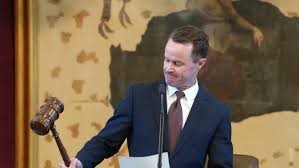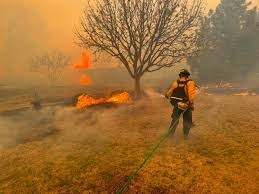
Here’s a quick recap of what happened over the last week:
Speaker Politics

Rep. Tom Oliverson – a Republican from the Cypress/Tomball area in northwest Harris County – announced yesterday that he is running for Speaker of the Texas House. Oliverson is an anesthesiologist in his fourth term in the House and currently chairs the House Insurance Committee. Oliverson pledged to change two major traditions regarding operations of the House. First, Oliverson said the Republican Caucus should choose the Speaker, meaning that all caucus members should vote in unison to reflect the will of the caucus. This will eliminate the possibility of a minority of the membership of the Republican Caucus teaming with the Democratic members to create a majority to elect the Speaker. Secondly, Oliverson pledged to appoint only Republican members to chair House committees. Since the session is still 10 months away, there will undoubtedly be more members that announce their intention to run for Speaker.
This announcement of the challenge to his leadership position comes as Speaker Phelan faces substantial hurdles in his campaign runoff battle – such as the endorsement of his opponent by former President Trump and Lt. Governor Dan Patrick – he is now facing significant hurdles to retaining his leadership position if he is able to win the runoff in May. One of his appointed chairmen – Rep. JM Lozano, a Republican from Kingsville – submitted an editorial to the Dallas Express this week where he said, “the voters have made it clear that Speaker Dade Phelan will not return as Speaker of the House.” This was done prior to Oliverson’s announcement so there was no mention of a specific candidate to replace Phelan.
Lozano submitted the piece with fellow Republican Rep. Tony Tinderholt of Arlington, who has been a consistent antagonist of Phelan’s leadership. Lozano was appointed by Phelan to chair the House Urban Affairs Committee in January of 2023, the beginning of the regular session.
One of the more striking and notable comments in the editorial was the call for the end of the practice of appointing Democrats to chair committees in the House. This aligns with what Oliverson has pledged to do. Currently there are 34 standing committees in the Texas House and two Select Committees. Nine of those committees have Democrats serving as chair of the committee. By comparison, the Senate has 16 standing committees, and one was chaired by a Democrat. Senator John Whitmire chaired the Senate Criminal Justice committee during the regular session but was recently elected mayor of Houston and has been replaced by Sen. Pete Flores, a Republican. So, the Senate now has no Democrats chairing committees.
The long-standing House practice of appointing Democrats to chair committees to foster bipartisan cooperation was harshly criticized by Phelan’s opponents during the primary campaign, with opponents saying that the voters have chosen Republicans to lead the House, so Republicans should be in charge of all committees.
For the first time in the primary season, Gov. Abbott appeared alongside Speaker Phelan – but it was not a campaign event. The two appeared together in Dallas to announce the consortium that will oversee grant money to support the state’s semiconductor industry. During the regular session, the legislature approved a new Semiconductor Innovation Fund that will assist companies that manufacture microchips and will enhance investment in chip design and related projects. Both state leaders confined their remarks to the issue at hand and did not take questions at the event.
However, when the event concluded, Phelan spoke to reporters and was very critical of Lt. Governor Dan Patrick for his involvement in Phelan’s reelection challenge. Phelan has been forced into a runoff against David Covey, who has been endorsed by former President Trump, Lt. Governor Patrick, and AG Ken Paxton. Phelan criticized Patrick for trying to gain more control over the Texas House, saying “he isn’t satisfied with being Lt. Governor anymore, he wants to be Speaker of the House…”. Phelan also told reporters he is confident that he will win reelection to his House seat and be reelected Speaker next January.
Border News

This week saw several days of back and forth regarding the implementation of a Texas law that allows state level law enforcement personnel to arrest migrants suspected of crossing the border illegally on state trespassing charges. The law was initially ruled unconstitutional by a federal district judge. Then the 5th Circuit Court of Appeals issued a stay on that ruling over the weekend that allowed the bill to go into effect. Then on Tuesday, the US Supreme Court agreed with the 5th Circuit and let the law go into effect, albeit temporarily. Late Tuesday night, two Supreme Court justices sent the case back to the 5th Circuit saying they had made procedural errors in their ruling to remove the stay from the district court, which led the 5th Circuit to hastily hold a hearing Tuesday night and issue another stay, blocking the bill from taking effect. Which is where things stand now.
Confusing enough? After all of the back and forth, the 5th Circuit Court finally held a hearing on Wednesday morning to hear arguments from the state of Texas and the US Department of Justice. No further rulings were made after the Wednesday morning hearing. Several migrant rights groups and the US Department of Justice have sued to stop the law from taking effect, saying that it is inconsistent with previously established precedence that immigration enforcement lies solely with the federal government.
The new Texas law will ultimately invite the US Supreme Court to revisit a similar law passed in 2012 by the state of Arizona that allowed state law enforcement there to arrest anyone believed to be in the country illegally. In that case, the Court ruled that states may not pass laws that are contrary to federal immigration law and policy. State leaders in Texas now believe the current makeup of the Supreme Court has the potential to make a ruling more favorable to the states.
Again, we now wait for the next step in the process which is a full hearing before the 5th Circuit Court of Appeals schedule for April 2nd. No timetable for a final decision has been given and the stay on allowing the law to take effect remains in place.
Wildfires in Panhandle

As of last Sunday, firefighters have completely contained the fires in the panhandle after a three-week battle with the fires that had become the largest in the state’s history. Two people were killed, and more than 1 million acres were burned across several counties. According to the Department of Agriculture, Texas is home to roughly 11 million head of cattle, with about 85% of that population located in the panhandle region. Investigations and damage assessments are still ongoing, but early estimates show more than 7,000 head of cattle died during the fires. Final numbers could reach as high as 10,000.
Relief efforts are ongoing as the federal government has set up outreach for disaster loans for those affected by the fires. The State Agriculture Relief Fund is also coordinating donations to be distributed. In addition to the loss of cattle and livestock, ranchers face the task of rebuilding barns, fencing, and other infrastructure related to their cattle operations.
NCAA Tournament Betting – Not in Texas

For the 6th straight year, the number of states allowing legal sports betting has increased. According to a report from NBC news released in advance of the beginning of this week’s NCAA basketball tournament, a total of 38 states now allow some form of sports betting. Texas is not one of them. Texas does have three federally recognized Indian Tribes that operate casinos, but they are not allowed to conduct sports betting.
In 2018, the US Supreme Court cleared the way for sports betting when it ruled states could legally establish laws to govern sports betting. The rules of play vary by state, with certain states prohibiting bets on their college teams, while others go all in and allow bets on the outcome of games as well as individual performances.
According to the NBC report, more than $121 billion was bet on all sports through legal wagering sites in 2023, an increase of 30% from 2022. The American Gaming Association estimates that nearly $3 billion will be bet on this year’s NCAA tournament. Vermont and North Carolina are the two latest states to join the sports betting industry. And there are other states with proposals under consideration this year where previous legislative attempts have failed. Missouri, Mississippi, Alabama, Georgia, and Minnesota are all giving consideration this year to various forms of sports betting proposals.
In last year’s regular session, the Texas House approved – by a 4-vote margin – a constitutional amendment to allow online sports betting. Any sports betting proposal in Texas would have to ultimately be approved by the voters. But last year’s proposal was never considered in the Texas Senate. The Lt. Governor and more conservative members of the Senate have historically been resistant to any type of gaming expansion in the state.
Look for more proposals in the 2025 legislative session when lawmakers convene in March, but the prospects remain a “long shot” given the current political makeup of the Texas Legislature. Anyone wanting to place a bet will have to continue to go to a neighboring state or Las Vegas to try their luck.
Political Notes
Lt. Governor Dan Patrick has made more endorsements in Texas House Republican primary races that are now headed to runoffs. Patrick endorsed former Trump campaign spokesperson Katrina Pierson in her challenge to incumbent Rep. Justin Holland of Rockwall. Pierson has also been endorsed by AG Ken Paxton. Patrick also endorsed Alex Kamkar in a runoff race for an open seat in the Pearland area. Kamkar faces Jeff Barry. Kamkar has also been endorsed by Gov. Abbott.
Republican state Rep. Craig Goldman of Fort Worth is being accused of violating federal campaign finance laws by helping raise money for Texas House Speaker Dade Phelan. Goldman is in a runoff against John O’Shea for a Fort Worth based Congressional seat to succeed retiring Congresswoman Kay Granger. Goldman has listed himself as a sponsor for a fundraising event for Phelan. Federal law requires a disclaimer on invitations where candidates for federal office are participating in an event for a non-federal candidate. The initial invitation sent out has no such disclaimer. Since candidates for federal offices are subject to limits on campaign donations — $3,300 per election – those giving more than that amount to Phelan could potentially be subjected to federal campaign violations as well.
President Biden was in Dallas on Wednesday and Houston on Thursday for a series of private reception fundraisers as he looks to build up his war chest that already totals $155 million cash on hand. Biden – as of now – has a substantial fundraising lead over rival Donald Trump. Biden’s total includes money raised through February. The Trump campaign has substantially less at $36 million cash on hand but has not released figures that include February fundraising totals.
The current chair of the Texas Republican Party will not seek reelection to the position. Matt Rinaldi has been chair of the state party since 2021 and says he is stepping down to focus on family obligations. Rinaldi has been a harsh critic of House Speaker Dade Phelan and led the party to censure Phelan in February for “lack of fidelity” to GOP principles – according to the censure resolution. Rinaldi has also been accused of having ties to admitted white supremacist Nick Fuentes. Rinaldi is a former House member from Dallas County who was defeated in 2018. His successor will be selected at the party’s state convention in late May in San Antonio. Rinaldi has endorsed current executive committee member Abraham George to be the party’s next leader. George was recently defeated in a Republican primary challenge to Rep. Candy Noble of Collin County. George will face current GOP party Vice Chair Dana Meyers in the election to lead the party.
What’s Next??
Hard to say what’s next. With the House in disarray, interim study issues may not be released until after the runoff – if at all. The Senate may issue interim study issues soon, but no date has been set.
With 9 incumbents being forced into runoffs, the fundraising for the May 28th election is in full swing. Eight candidates have scheduled Austin fundraisers for the first week of April, and others are sure to follow.
